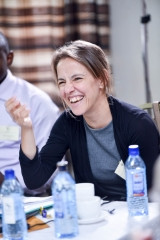
Dr Cristina Santos
Senior Lecturer In Economics
Biography
Professional biography
Dr Cristina Santos is a Senior Lecturer in Economics at the Open University. She obtained her PhD Economics at University College London (2013).
Research interests
Her research interests and publications span the areas of health, education, gender, intrahousehold inequalities, domestic violence, happiness, and the capabilities approach. She has designed, implemented, and evaluated programmes in education and health, and supported the design and analysis of surveys in several Sub-Saharan African countries. She is currently conducting research on mixed methods and on the capabilities approach. She is a co-Investigator of the GCRF Inclusive societies project entitled “How to link industrial and social innovation for inclusive development: lessons from tackling cancer care in Africa” https://www.open.ac.uk/researchprojects/innovation-cancer-care-africa/people/dr-cristina-santos.
Teaching interests
Cristina Santos has led the production and presentation of several undergraduate Economics modules. More recently she has led the the production of the Econometrics strand in M348 Applied Statistical Modelling module. She is currently a module team member in DD320 Doing Economics: Inequalities, Innovation and Environment.
She is currently supervising two PhD students and has successfully supervised three PhD students to completion. She welcomes applications.
She is a Senior Fellow of the Higher Education Academy (SFHEA).
Projects
How to link industrial and social innovation for inclusive development: lessons from tackling cancer care in Africa
This new project is supported by the ESRC under the GCRF Inclusive Societies initiative. It aims to demonstrate the benefits for inclusive development of linking local industrial and social innovation in Sub-Saharan Africa (SSA). It will do this by addressing the “hard case” of increasing access to cancer care in East Africa.
Long-term conditions and mental health in Sub-Saharan Africa: mainstreaming community-based practices
We will establish the first consortium to focus systematically on building evidence and community practice to tackle comorbidity between mental illness and other long-term conditions (LTCs) in Sub-Saharan Africa (SSA). Such comorbidity is increasing rapidly and presents a major challenge to SSA health care provision. Community-based interventions appear to be an efficacious response to this problem. However evidence to support this is still weak, especially in SSA. This proposal builds on our existing collaborations which have begun to examine the scope for inclusive and affordable community practice to tackle such comorbidities (Lloyd et al., 2015; Meddenhall et al., 2017). This proposal will build a sustainable research network of African and UK researchers to: 1. Generate a greater shared understanding of existing research on the interrelationships between mental health and other LTCs and the role of community engagement in SSA in tackling the challenge; 2. Identify gaps in current research and practice in different SSA countries from a range of disciplinary perspectives and experience; 3. Develop methodologies for combining research and practice to create and evaluate partnerships with communities for problem identification, decision-making and shared actions for prevention, treatment and management of comorbid mental and physical LTCs; 4. Develop and submit research proposals based on these methodologies; 5. Support the development and training of novice/early career researchers from SSA; 6. Create low cost-effective networking among a new strong and sustainable African network with UK partners for a long term impact in health research.
Publications
Book Chapter
Beyond “Late Presentation”: Explaining Delayed Cancer Diagnosis in East Africa (2024)
Innovation and Policy in Cancer Pain Management: Systemic Interactions in Tanzania (2024)
Journal Article
Are we empowering women? (2017)
Costs of Domestic Violence: A Life Satisfaction Approach (2013)
Sharing of resources within the family and the economics of household decision-making (2013)
Other
Wealth Accumulation and Home Ownership of US young adults: 2005-2009 (2012)
Estimating linear birth cohort effects: revisiting the age-happiness profile (2007)
Preprint / Working Paper
Perspectives of providers of cancer care in Tanzania: evidence and implications for policy (2023)
Cancer patients’ pathways: evidence and implications for policy (2020)
Report
Education Workforce Initiative: Initial Research (2018)
Costs of domestic violence: a life satisfaction approach (2012)
Revisiting the age-happiness profile: Estimating age, period and cohort effects (2011)
Gender incidence analysis of indirect taxes in the UK (2009)
Thesis
Dimensions of Well-Being: Earnings, Happiness and Domestic Violence (2013)